- Home
- Howard Jacobson
J Page 3
J Read online
Page 3
The next day, turning up for work as usual, she was knocked down by a motorcyclist who had mounted the pavement in what passers-by described as a ‘vicious rage’.
Coincidences happen.
iii
Ailinn, anyway – whatever the state of things in the rest of the country, and others were now openly saying what Esme Nussbaum had said in her long-suppressed report – had sported a bruise under her right eye when Kevern saw her for the first time, standing behind a long trestle table on which were laid out for sale jams, marmalades, little cakes, pickles, hand-thrown pots and paper flowers.
‘Fine-looking girl, that one,’ a person Kevern didn’t know whispered in his ear.
‘Which one?’ asked Kevern, not wanting to be rude, but not particularly wanting to be polite either.
‘Her. With all the hair and the purple eye.’
Had Kevern been in the mood for conversation he might have answered that there was more than one among the women selling preserves and flowers who had a purple eye. But yes, the black hair – thick and seemingly warm enough to be the nest of some fabulous and he liked to think dangerous creature – struck him forcibly. ‘Aha, I see her,’ he said, meaning ‘Leave me alone.’
Impervious, the stranger continued. ‘She’ll say she walked into a door. The usual excuse. Needs looking after, in my humble opinion.’
He was dressed like a country auctioneer – of pigs, Kevern thought. He had a pleated, squeeze-box neck, which rippled over the collar of his tweed hacking jacket, and the blotched skin of someone who’d spent too much time in the vicinity of mulch, manure and, yes, money.
‘Aha,’ Kevern said again, looking away. He hoped his unfriendly demeanour would make it clear he didn’t welcome confidentiality, but he mustn’t have made it clear enough because the man slipped an arm through his and offered to introduce him.
‘No, no, that’s not necessary,’ Kevern said firmly. He started from all strangers instinctively, but this one’s insinuating manner frightened and angered him.
The introduction was effected notwithstanding. Kevern was not sure how.
‘Ailinn Solomons, Kevern Cohen. Kevern Cohen . . . but you know each other now.’
They shook hands and the go-between vanished.
‘A friend of yours?’ Kevern asked the girl.
‘Never seen him in my life. I can’t imagine how he knows my name.’
‘I ask myself the same question.’
They exchanged concerned looks.
‘But you’re from here, aren’t you?’ the girl said.
‘Yes. But I too have never seen him in my life. You obviously are not from here.’
‘It shows?’
‘It shows in that we have never before met. So you’re from where . . .?’
She flung a thumb over her left shoulder, as though telling him to scoot.
‘You want me to go?’
‘No, sorry, I was showing you where I’m from. If that’s north, I’m from up there. Forgive me, I’m nervous. I’ve been spooked by what’s just taken place. I haven’t been here long enough for people to know my name.’
She looked around anxiously – Kevern couldn’t tell whether to get a second look at the man or to be certain he had gone for good. In deference to her anxiety he made light of his own. (He too had been spooked by what had just occurred.) ‘You know these village nosey parkers. He’s probably an amateur archivist.’
‘You have archives here?’
‘Well, no, not officially, but we have the occasional crazy who enjoys hoarding rumours and going through people’s rubbish bins. I have one as a neighbour, as it happens.’
‘And you let him go through yours?’
‘Oh, I have no rubbish.’
He enjoyed the sensation of her looking through him. He wanted her to know that any secrets he had, she was welcome to.
‘Well I don’t think our man was an archivist,’ she said. ‘He looked too interested in himself. I’d say he was an auctioneer of pigs.’
Kevern smiled at her.
‘Which doesn’t explain . . .’
‘No, it doesn’t . . .’
She was a fine-looking girl, delicately strung, easy to hurt despite the dangerous thicket of her hair. He thought he detected in himself an instinct to protect her. Absurdly, he imagined rolling her in his rug. Though what good that would have done her, he couldn’t have said.
‘You don’t have an “up there” accent,’ he said.
‘And you don’t have a “down here” one.’
They felt bonded in not sounding as though they were from either place.
Emboldened by this, he pointed to her bruise. ‘Who did that to you?’
She ignored the question, going behind the stall to rearrange the flowers. Then she looked him directly in the eyes and shrugged. It was a gesture he understood. Who’d done that to her? It didn’t matter: they all had.
Years before, he’d been a choirboy at the church and, because he had a flutey tenor voice ideally suited to Bach’s Evangelist, still sang there every Christmas when they performed the expurgated version of the St Matthew Passion. He didn’t normally attend fetes – he was not a festive man – but several people from the church had urged him to attend. ‘Why?’ he’d asked. ‘Just come along, Kevern,’ they’d said, ‘it will do you good.’ And more flyers publicising the event were popped through his letter box than he could recall receiving for similar events.
On the morning of the fete, the vicar, Golvan Shlagman, even rang to make sure he was coming. Kevern said he was undecided. He had work to do. All work and no play, the Reverend Shlagman quipped. He hoped Kevern would try his best. It wouldn’t be the same without his presence. Kevern didn’t see why. Why was his presence a matter of significance suddenly? ‘We can’t do without the Evangelist,’ the vicar laughed, though no Mass or Passion was being sung.
Thinking about it later, Kevern thought Shlagman’s laughter had been only just the sane side of hysterical.
Had he hysterically laughed Ailinn into coming to the fete, too?
Seeing as they mistrusted strangers equally, didn’t speak in the accents of where they resided, and knew a pig auctioneer when they saw one, he asked her out.
She took a minute or two to decide. He, too, was a stranger, she seemed to be reminding him.
He understood. ‘A little walk, that’s all,’ he said. ‘Nowhere far.’
On their first date he kissed the bruise under her eye.
He was not a man who raised his arm to women and hadn’t been stirred to anger when Ailinn called him thick-headed. He only nodded and smiled lugubriously – it was that dopey-eyed, lugubrious smile that had earned him the nickname Coco, after a once famous clown who sometimes reappeared, accompanied by apologies for the cruelty visited on him, in children’s picture books. She was right, when all was said and done. He was a lolloping unfunny clown with a big mouth who didn’t deserve her love. And now – she made no attempt to stop him getting up and leaving – he’d lost it.
He reproached himself for being too easily put off. It didn’t have anything to do with Ailinn; he lacked the trick of intimacy, that was all. On the other hand, the thickness of her ankles relative to the slenderness of her frame – especially the right one, around which she wore a flowery, child-of-nature anklet – did upset him, and on top of that, like every other village girl, no matter that she came from a village at the other end of the country, she smelt of fish.
But then there were other girls in the village, and although they had always treated him with that degree of watchfulness they reserved for people to whom they weren’t related, their availability took the edge off his desolation. He was alone, but on any evening he could drop by the Friendly Fisherman and fall into conversation with one or other of them. And at least at the bar the smell of beer took away the smell of fish.
He sat on his bench absent-mindedly, watching the seals flop, enjoying the spray on his face, thinking about everything and nothing, exclai
ming ‘esus Christ!’ to himself from time to time, until the sun sank beneath its own watery weight into the sea. It became immediately chilly. Feeling the cold, he rose from the bench and decided to try his luck. Company was company. He called by the cottage first and peered in through the letter box. All was almost well. He was still in, still reading his mail in his carpet slippers, still watching television. And his rug was still rumpled. But his utility phone was flashing vermilion, which meant somebody had rung him. Perhaps Ailinn saying she was sorry, though she had done nothing to say sorry for.
After the falling-out, the saying sorry. That was the way. They had all been taught it at school. Always say sorry.
If it was she who had rung him, should he ring her back? He didn’t know.
In agitation, because the knowledge that he’d been rung – no matter by whom – distressed him, he let himself in, discovered the caller had left no message – though he thought he detected the breath of someone as agitated as himself – and locked up again. Fifteen minutes later he was in the Friendly Fisherman, ordering a sweet cider.
iv
The inn was more than usually noisy and querulous. That fractiousness which was being reported as on the increase throughout the country was no less on the increase here. There’d been an incident earlier in the village hall and some of the bad feeling had spilled out into the inn from that. It was Thursday, Weight Watchers day, and one of the village women, Tryfena Heilbron, had refused to accept that she’d put on a pound since the last time she’d been weighed. Words had been exchanged and Tryfena had lifted the scales and dashed them to the ground. ‘Next time bring scales that work,’ she’d shouted at the weigher who shouted back that it was no surprise to her that Tryfena’s husband preferred the company of sweeter-tempered, not to say more sylphlike, women.
By the time news of the altercation reached the Friendly Fisherman the men were involved. Breoc Heilbron the haulier, a dangerous brute of a man even when sober, was drunkenly defending the honour of a wife he didn’t scruple at other times to abuse. It struck Kevern Cohen as a sign of the times that men who would once have steered clear of Breoc Heilbron’s temper were prepared tonight to needle him, not only man to man, by impugning his capacity to hold his drink, but by referring to his wife’s notorious temper and even to her weight. Was he imagining it or did he actually hear someone describe her as a heifer? That heifer, Tryfena Heilbron.
That was how people had begun to talk of one another. That heifer, Tryfena Heilbron. That lump of lard, Morvoren Steinberg.
Followed by an apology to Morvoren’s husband.
And no doubt, that idiot Kevern Cohen.
Kevern tried to remember whether the village had ever in reality been the placid haven pictured in its brochures by New Heritage, that body to which every taxpayer in the country was expected to contribute in return for an annual weekend away from the growing turmoil of the towns. Had it? He didn’t think so. Most of the teachers at the village school he had attended had been free with the cane or the slipper before saying sorry. The boys had brawled viciously in the playground. So had the girls. Tourists on their annual weekend breaks were laughed at behind their backs and made to feel unwelcome in the inns, for all that their custom was indispensable to the local economy. But he thought there had been some days when everything was quiet and everyone rubbed along. Whereas now it was never quiet, and no one rubbed along.
He joined in an ill-tempered game of darts with a group of sullenly drunken men, including Densdell Kroplik, failing to hit a single number he was required to hit and having to buy a round of drinks for his team as a consequence.
‘Up yerz,’ Kroplik said, raising his glass. Kevern laughed, not finding it funny. He wondered again what possessed him ever to let the barber near his throat with a razor.
The other men apologised.
‘Not necessary,’ Kevern told them.
Densdell Kroplik didn’t think it was necessary either. ‘Don’t yez go apologising for me,’ he said, spitting on the floor. ‘I do my own, when the time’z right, and thiz izn’t.’
Kevern walked away. He wanted to leave, but didn’t. His cottage was quiet and he needed noise. A little later, he accepted a challenge to play pool from a handsome, broad-shouldered woman who ran the mug and tea-towel shop in which he sold his lovespoons. Hedra Deitch.
She scattered the balls with an alarming vehemence, called Kevern ‘my lover’, and made derogatory remarks to him about her husband who was slumped at the bar like a shot animal, coughing out the last of his blood into a pint pot of brown ale.
‘That’s how he looks when he finishes himself over me,’ she said, in a voice loud enough for him to hear.
Kevern wasn’t sure what to say.
‘Eat shit!’ her husband called across to her.
‘Eat shit yerself!’
Kevern thought about leaving, but stayed.
‘You think he’d be only too glad to give me a divorce,’ Hedra Deitch went on. ‘But oh, no. We must stay together for the children, he says. That’s a laugh. He doesn’t give a flyin’ fuck for the children and suspects they’re not his anyway.’
‘And are they?’ Kevern asked.
‘What do you think, my lover?’
‘I can’t imagine you passing off another man’s children as his,’ Kevern said.
She choked on her laughter. ‘You can’t imagine that, can’t you? Then you doesn’t have a very vivid imagination.’
Kevern tried imagining, then thought better of it. He went home alone, after submitting briefly to one of Hedra Deitch’s muscular snogs. Forcing brutish kisses on people you neither knew well nor cared much for wasn’t confined to men. Both sexes broke skin when they could.
A sharp-edged moon lit his way. Once upon a time he’d have been able to hear the sea on a night such as this, the great roar of the ocean sucking at the rocks, breathing in and then breathing out, but the din of voices raised in brawling throughout the village drowned out all other sounds. A quarter of a mile up the road to his cottage he passed the Deitches kissing passionately in a doorway. To Kevern they resembled a single beast, maddened by the need to bite its own mouth. Great fumes of beer and fish rose from its pelt. If Kevern’s ears didn’t deceive him, Hedra Deitch was alternately telling her weasel husband to eat shit and apologising to him.
The unseasonably warm wind of earlier in the day – smelling of seals and porpoises, Kevern thought – had turned cold and bitter. Something far out to sea was rotting.
He could have done with company, but he knew it was his own fault he had none. ‘Company is always trouble,’ his father used to say, laughing his demented solitary laugh. But he didn’t have to listen to his father. Taking after your father was optional, wasn’t it?
He knelt on one knee and peered in through the letter box of his cottage. Shocked by what he saw, he staggered backwards. The cottage had been ransacked. There was blood on the carpet. In the two or three seconds it took him to recover himself, he wondered why he was surprised. This was no more than he’d been expecting. And now the knife between his shoulder blades . . .
He looked again, not afraid of what he’d see. Relieved, he thought.
At last.
But everything was, after all, exactly as he’d left it – the disrespected rug, the teacup, the slippers. There was a blue glow from the television. All was well. He was in. Alone.
It was his utility phone that was flashing the colour of blood.
It sounded like singing. Not a choir, something more random and impatient, a hubbub set to music. He could smell burning but saw no fire, only smoke. Then an enormous rose of flame opened briefly as though, with one supreme effort, it meant to enfold the charred sky in its petals. Against the flame he was able to make out the silhouette of a figure, a slight boy, falling from a high wall. Even before the boy reached the ground the singing grew ecstatic, as though the singers believed their chanting was responsible. ‘Down with the enemies of—!’ they cried. He couldn’t make out
the word in the frenzy of its delivery. Life, was it? Down with the enemies of Life? Or mice? Down with the enemies of Mice? Down with them, anyway. He thought he recognised the keep from whose tower the boy, like a doll with no weight, continued to float and lightly fall to earth. Yes, he knew it. Inside those walls, inside that fire, he had knelt by the body of a mother – he couldn’t say, after all this time, if she were his. Her eyes were open but unseeing. Her clothes had been torn from her body. Where her throat was cut a scarlet rose flowered, smaller than the one that had briefly illuminated the sky, but no less remarkable. Its loveliness flowed from it in a stream, running down her breast. He dipped his finger in it, as though it were wine, and put it to his lips. Down with me, he thought.
TWO
Twitternacht
Friday 27th
HO, HUM . . .
For anyone opening my diary for the first time – and it’s for futurity in all its misty uncertainty that I write – ho hum denotes the sound of my mind whirring, not cynicism.
It would appear that he learnt to take these Byzantine precautions from his parents, as they, perhaps, had learnt to take them from theirs, otherwise they denote nothing other than an uncommonly anxious disposition . . .
So concluded the first report on Kevern ‘Coco’ Cohen I ever wrote. I have a copy in front of me in a black folder. Always wise to keep a copy. I was guessing, I admit that much, but guesswork is an important part of what I have been entrusted to do. Guesswork informed by a knowledge of the ways of men, I mean, a trustworthiness of intuition and a shrewdness of observation, which I flatter myself I possess in as great a measure as any person. Perhaps more. I work – I don’t call my observations of Kevern Cohen ‘work’ – in one of the most trustworthy and ophthalmically demanding professions, as a teacher of the Benign Visual Arts. I am also a painter myself. Landscapes, naturally. Hence their giving me far west Bethesda as my territory. Bethesda with its long history of naive art – spirituality apprehended in the everyday – and of course St Mordechai’s Mount which I can see from my studio window and walk to when the tide is out. Modesty should forbid me mentioning my Seventeen Sketches of St Mordechai’s Mount In All Seasons which enjoy prominence in the Parochial Beauty Rooms at the New National Gallery, but they are my best work to date and I am proud of them. I would have preferred to stay in the Capital, for all its troubles – if only to enjoy the illusion of being at the centre of things and eating a little better – but the position I occupy in the Bethesda Art Academy has its consolations. Head of painting within a department as dedicated to feeling as any in the country is not a job you sniff at. I’ve heard it argued that Bethesda found it easier than most art colleges to make the journey back from insentience to feeling because for us, feeling never really went away. Conceptualism, or mind-machine art as historians now call it, had always been more of a city than a country fad. It had been practised down here but without any real zest or instinct for it. A few local potters defied the tradition of their craft, forgot or simply refused to remember that a pot’s job was to express, in silence and slow time, a flowery tale with sweetness, and set about throwing misshapen objects that had no utility except to offend whoever looked on them by virtue of the obscene acts they depicted. The art, they explained, when they could be bothered to explain anything, lay precisely in the offence. But the joke never took. Obscenities don’t shock country people who practise them without thinking twice. And as for the ironies of installation art, you needed department stores all around you to appreciate those, just as you need the colours of a big sky and the changeability of a turbulent sea to understand why painters have to paint. The pursuit of beauty is no mystery when you wake to it each day. And I have always argued that the real sentimentality is not the indulgence of colour but the denial of it. It went missing, anyway. Three generations lived and died without seeing colour except in its lipstick-pink and electric-blue manifestations, flashing tubes and the like, ironic statements about colour and its production, denying the naked sensuousness that makes true lovers of painting believe they are seeing the face of God. But enough of that. You will find my thoughts on the subject – much extended – in many a volume of Sublime Quarterly, Bethesda’s own art magazine, which can be ordered from any gallery shop in the country and also a good number of the better newsagents. I write under my own name – Edward Everett Phineas Zermansky (Everett to my friends, Phinny to my family) – and am told that I am highly readable.

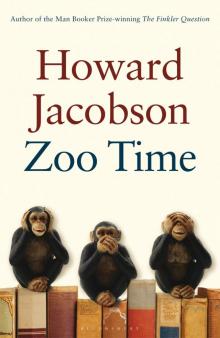 Zoo Time
Zoo Time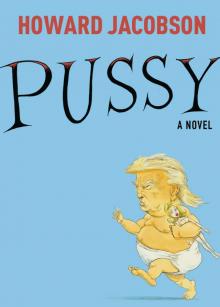 Pussy
Pussy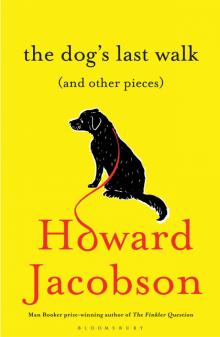 The Dog's Last Walk
The Dog's Last Walk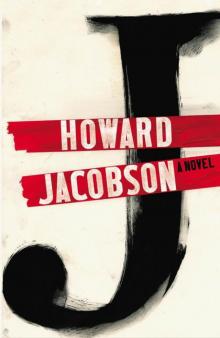 J
J Shylock Is My Name
Shylock Is My Name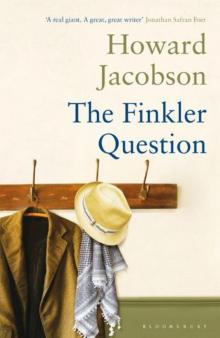 The Finkler Question
The Finkler Question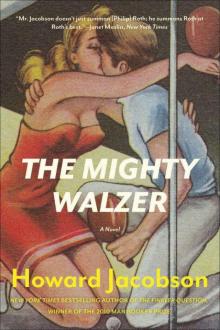 The Mighty Walzer
The Mighty Walzer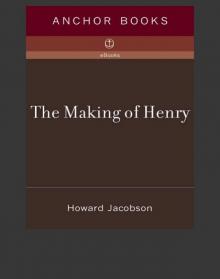 The Making of Henry
The Making of Henry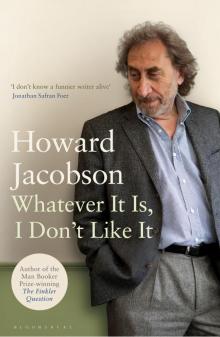 Whatever it is, I Don't Like it
Whatever it is, I Don't Like it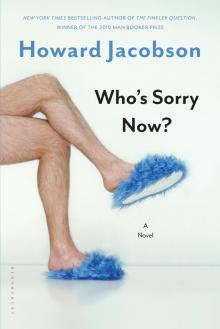 Who's Sorry Now?
Who's Sorry Now? Kalooki Nights
Kalooki Nights